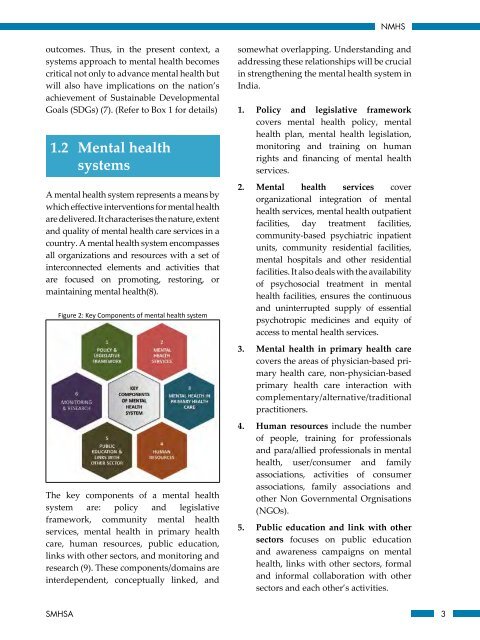National Mental Health Survey of India 2015-16
NMHS%20Report%20%28Mental%20Health%20Systems%29%201
NMHS%20Report%20%28Mental%20Health%20Systems%29%201
You also want an ePaper? Increase the reach of your titles
YUMPU automatically turns print PDFs into web optimized ePapers that Google loves.
NMHS<br />
outcomes. Thus, in the present context, a<br />
systems approach to mental health becomes<br />
critical not only to advance mental health but<br />
will also have implications on the nation’s<br />
achievement <strong>of</strong> Sustainable Developmental<br />
Goals (SDGs) (7). (Refer to Box 1 for details)<br />
1.2 <strong>Mental</strong> health<br />
systems<br />
A mental health system represents a means by<br />
which effective interventions for mental health<br />
are delivered. It characterises the nature, extent<br />
and quality <strong>of</strong> mental health care services in a<br />
country. A mental health system encompasses<br />
all organizations and resources with a set <strong>of</strong><br />
interconnected elements and activities that<br />
are focused on promoting, restoring, or<br />
maintaining mental health(8).<br />
Figure 2: Key Components <strong>of</strong> mental health system<br />
The key components <strong>of</strong> a mental health<br />
system are: policy and legislative<br />
framework, community mental health<br />
services, mental health in primary health<br />
care, human resources, public education,<br />
links with other sectors, and monitoring and<br />
research (9). These components/domains are<br />
interdependent, conceptually linked, and<br />
somewhat overlapping. Understanding and<br />
addressing these relationships will be crucial<br />
in strengthening the mental health system in<br />
<strong>India</strong>.<br />
1. Policy and legislative framework<br />
covers mental health policy, mental<br />
health plan, mental health legislation,<br />
monitoring and training on human<br />
rights and financing <strong>of</strong> mental health<br />
services.<br />
2. <strong>Mental</strong> health services cover<br />
organizational integration <strong>of</strong> mental<br />
health services, mental health outpatient<br />
facilities, day treatment facilities,<br />
community-based psychiatric inpatient<br />
units, community residential facilities,<br />
mental hospitals and other residential<br />
facilities. It also deals with the availability<br />
<strong>of</strong> psychosocial treatment in mental<br />
health facilities, ensures the continuous<br />
and uninterrupted supply <strong>of</strong> essential<br />
psychotropic medicines and equity <strong>of</strong><br />
access to mental health services.<br />
3. <strong>Mental</strong> health in primary health care<br />
covers the areas <strong>of</strong> physician-based primary<br />
health care, non-physician-based<br />
primary health care interaction with<br />
complementary/alternative/traditional<br />
practitioners.<br />
4. Human resources include the number<br />
<strong>of</strong> people, training for pr<strong>of</strong>essionals<br />
and para/allied pr<strong>of</strong>essionals in mental<br />
health, user/consumer and family<br />
associations, activities <strong>of</strong> consumer<br />
associations, family associations and<br />
other Non Governmental Orgnisations<br />
(NGOs).<br />
5. Public education and link with other<br />
sectors focuses on public education<br />
and awareness campaigns on mental<br />
health, links with other sectors, formal<br />
and informal collaboration with other<br />
sectors and each other’s activities.<br />
SMHSA<br />
3


